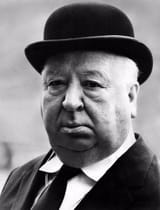Alfred Hitchcock is the undisputed heavyweight of suspense, and Fritz Lang—visionary as he was—simply never matched him.
Hitchcock’s genius lay in turning the camera into a psychological scalpel. He didn’t just show you a murder; he made you feel the guilt of the murderer, the terror of the victim, the complicity of the witness. Vertigo, Psycho, Rear Window—these aren’t just thrillers, they’re immersive panic attacks committed to celluloid.
Lang, for all his groundbreaking camera angles and dystopian grandeur, kept you at arm’s length. M and Metropolis are visually staggering, yes, but they’re thesis statements first, stories second. You admire the architecture; you don’t live inside it. Hitchcock’s worlds are cramped apartments, fogged train cars, and shower stalls—places where ordinary people discover how thin the veneer of civilization really is.
And that’s the other edge: character empathy. Grant, Stewart, Leigh, Novak, Perkins—Hitchcock’s leads are flesh-and-blood neuroses we recognize in ourselves. Lang’s protagonists often feel like symbols wearing trench coats, delivering pronouncements on fate instead of sweating through moral dilemmas. When Norman Bates stammers, “We all go a little mad sometimes,” it slices because it could be us. When Lang’s Dr. Mabuse rants about world domination, it’s chilling, but it’s also safely abstract.
Hitchcock engineered suspense as intimate, almost voyeuristic experience; Lang orchestrated it as social indictment.
4chan Search
1 results for "3a0c84c9bd5f237d17ea25e7f53955fa"
